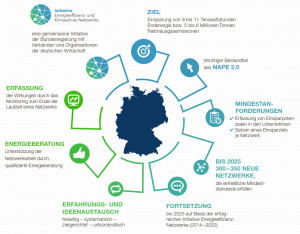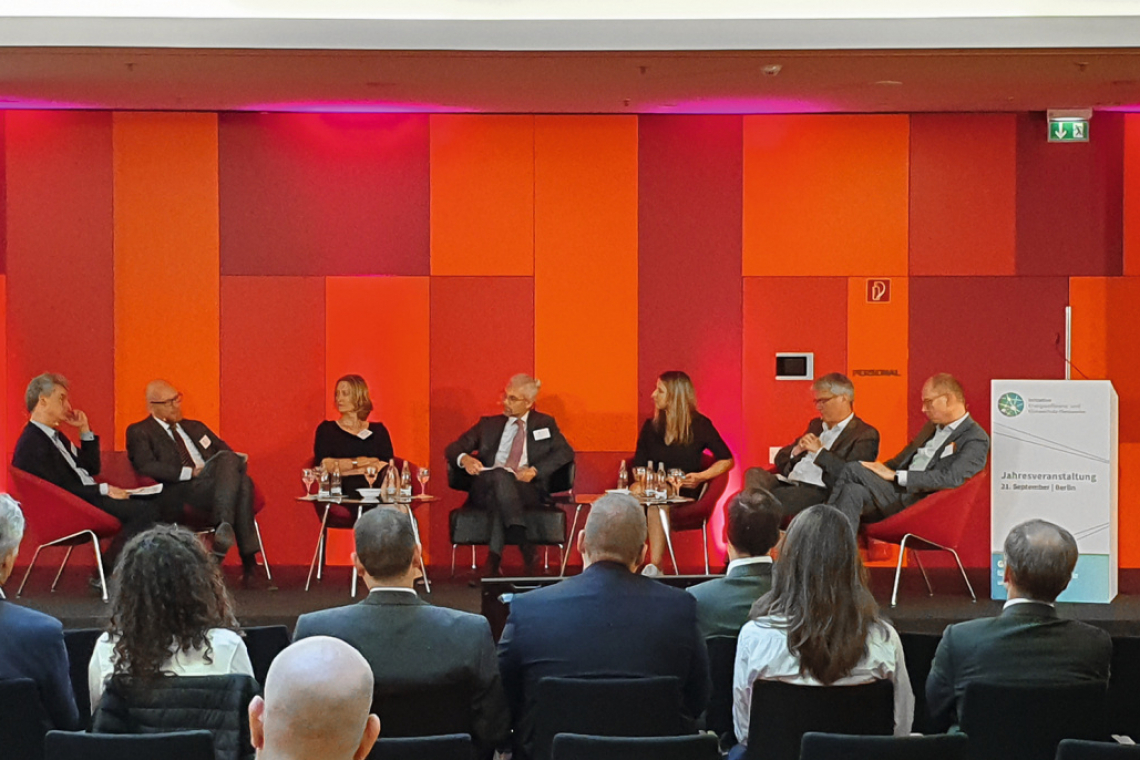The annual event of the Initiative Energy Efficiency and Climate Protection Networks (IEEKN) focused on discussions about Germany's climate-neutral economy. Representatives from politics, business and science came together under the motto "Together for more energy efficiency and climate protection" to discuss the successes and opportunities of networking.
The focus of the IEEKN's annual event on September 21, 2023 was, among other things, the Energy Efficiency Act, which will soon be voted on in the Bundestag. It obliges companies to draw up concrete plans for the implementation of cost-effective energy efficiency measures. Despite the urgency of key data on the Energy Efficiency and Climate Protection Networks initiative, which has already brought together 3,300 companies to develop solutions and implement savings. Some funding programs are specifically tailored to SMEs. Several surveys on energy and resource savings show that the willingness to invest in energy efficiency has fallen due to a lack of planning certainty, high energy prices and economic challenges [1, 2]. According to the Energy Efficiency Index, it is at its lowest level in the last ten years [3]. However, investments in energy efficiency and climate protection are not only crucial for Germany's energy and climate targets, but also strengthen the resilience of companies in times of crisis. Various studies have come to the conclusion that German industry can reduce its energy requirements by around 20 % by 2030 through efficiency gains and process changes alone [4, 5, 6]. The companies in the network initiative are already making great strides in this area. Federal Minister for Economic Affairs and Climate Protection, Dr. Robert Habeck, emphasized in a video message: "The Energy Efficiency and Climate Protection Networks initiative brings companies together to provide practical support in moving towards climate neutrality together. Sharing experiences in a network helps companies to gain valuable know-how and implement worthwhile measures."
key data on the Energy Efficiency and Climate Protection Networks initiative, which has already brought together 3,300 companies to develop solutions and implement savings. Some funding programs are specifically tailored to SMEs. Several surveys on energy and resource savings show that the willingness to invest in energy efficiency has fallen due to a lack of planning certainty, high energy prices and economic challenges [1, 2]. According to the Energy Efficiency Index, it is at its lowest level in the last ten years [3]. However, investments in energy efficiency and climate protection are not only crucial for Germany's energy and climate targets, but also strengthen the resilience of companies in times of crisis. Various studies have come to the conclusion that German industry can reduce its energy requirements by around 20 % by 2030 through efficiency gains and process changes alone [4, 5, 6]. The companies in the network initiative are already making great strides in this area. Federal Minister for Economic Affairs and Climate Protection, Dr. Robert Habeck, emphasized in a video message: "The Energy Efficiency and Climate Protection Networks initiative brings companies together to provide practical support in moving towards climate neutrality together. Sharing experiences in a network helps companies to gain valuable know-how and implement worthwhile measures."
In networks, companies can learn from each other, so technical solutions can be implemented more quickly and the networks also help to better navigate the funding jungle, as Maaß emphasized. Liedtke pointed out that companies in networks receive higher funding rates. Andreae warned that although the gas supply had been secured for the time being with the construction of the LNG terminals, work still needed to be done on savings and energy efficiency measures in order to remain competitive. Bäumchen spoke out in favor of affordable electricity, as many energy efficiency measures involve switching to electricity. Although the use of waste heat has great potential, it is currently still very expensive, as Dercks noted. At the annual event, company networks were also honored for their outstanding commitment to energy efficiency and climate protection: The company network "dekarbN" from the Munich area, the supra-regional industry network "gr-EEN VKU Wasser II" and the "Energy Efficiency and Climate Protection Network Chemnitz".
Literature
[1] Survey by the BDI, Situation in the industrial SME sector 2023, p. 2: https://bdi.eu/artikel/news?tx_news_pi1%5Bnews%5D=10049&cHash=68df3e64edfe1e5df9187e382cecf024
[2] Energy transition barometer 2023 of the IHK organization - company survey on the implementation of the energy transition and climate protection, p. 7: https://www.dihk.de/de/themen-und-positionen/wirtschaftspolitik/energie/energiewende-barometer-2023-98914
[3] Summer survey 2023 of the Institute for Energy Efficiency in Production (EEP): https://www.eep.uni-stuttgart.de/eei/aktuelle-erhebung/
[4] dena flagship study Towards climate neutrality 2021, p. 12: https://www.dena.de/newsroom/meldungen/dena-leitstudie-aufbruch-klimaneutralitaet/
[5] Ariadne Report - Germany on the way to climate neutrality in 2045. Scenarios and paths in model comparison, Ariadne project, 2021, p.123: https://ariadneprojekt.de/publikation/deutschland-auf-dem-weg-zur-klimaneutralitat-2045-szenarienreport/
[6] Energy efficiency in production. Study on the need for action and research, Fraunhofer Gesellschaft, 2008, p. 3: https://www.fraunhofer.de/content/dam/zv/de/forschungsthemen/energie/Studie_Energieeffizienz-in-der-Produktion.pdf


